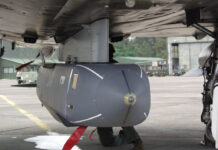
UK’s Labour government initiates new ‘root and branch’ Strategic Defence Review
Peter Felstead
The United Kingdom’s new prime minister, Keir Starmer, has commissioned a ‘root and branch’ Strategic Defence Review “to make Britain secure at home and strong abroad for decades to come”, according to a 16 July 2024 press release from the UK Ministry of Defence (MoD).
Starmer became UK prime minister on 5 July after a landslide victory by the Labour Party in the country national election on 4 July.
To be overseen by Defence Secretary John Healey and headed by former NATO secretary general and UK defence secretary Lord Robertson, the review “will be delivered at pace and report in the first half of 2025, with work starting immediately in recognition of the urgency of the threats facing the UK”, the MoD stated.
Alongside Lord Robertson will be two other ‘external reviewers’: Dr Fiona Hill CMG, a foreign policy expert and former US presidential advisor; and Sir Richard Barrons, a former commander of UK Joint Forces Command and former deputy chief of the defence staff.
The reviewers will be supported by a Defence Review Team of senior high-level experts from inside and outside government and will engage widely across the defence community, according to the MoD. The Defence Review Team will be supported by a secretariat from the MoD.
Submissions to the review will be invited until the end of September from serving and retired members of the armed forces, the defence industry, the general public, academics, Parliament, and the UK’s closest allies and partners, especially in NATO.
“Today’s announcement is the next step following a successful NATO Summit in Washington, where the Prime Minister reaffirmed his “serious commitment” to spending 2.5% of GDP on defence and to the Alliance,” the MoD stated. “Amid war in Europe after Putin’s illegal invasion of Ukraine, conflict in the Middle East and global threats increasing, the review will consider the threats Britain faces, the capabilities needed to meet them, the state of UK armed forces and the resources available. It will ensure a ‘NATO-first’ policy is at the heart of Britain’s defence plans.”
Starmer was quoted by the MoD as saying, “We live in a more dangerous and volatile world. My government will forge a new clear-eyed approach to our national defences, equipping us to tackle international threats head-on while keeping the British people safe and secure. … We will make sure our hollowed out armed forces are bolstered and respected, that defence spending is responsibly increased, and that our country has the capabilities needed to ensure the UK’s resilience for the long term.”
Healey added, “At the start of a new era for Britain, we need a new era for defence. Hollowed-out armed forces, procurement waste and neglected morale cannot continue. Meanwhile, we need to be clear eyed about the threats we face, with the world becoming more volatile and technology changing the nature of warfare.
In response, our armed forces need to be better ready to fight, more integrated and more innovative,” he added. “We need clearer accountability, faster delivery, less waste and better value for money.”
The UK MoD is frequently criticised for how little ‘bang for the buck’ it gets from the UK defence budget. While a number of recent programmes have been wasteful – and major projects in the past aborted altogether – a major cost borne by UK defence spending is maintaining the UK’s nuclear deterrent in the form of four nuclear-powered ballistic missile submarines (SSBNs) and the Trident nuclear missiles they carry.
Annual in-service costs for the nuclear deterrent are currently around 6% of the total defence budget, or approximately GBP 3 billion (EUR 3.57 billion) for 2023/24, based on planned defence expenditure.
According to the UK’s 2015 Strategic Defence and Security Review, the estimated cost of designing and manufacturing of a class of four Dreadnaught-class SSBNs to replace the current Vanguard-class boats is GBP 31 billion, including inflation over the 35-year life of the programme, although a GBP 10 billion contingency has also been set aside in case costs escalate. In February 2020 the UK government also confirmed that a Nuclear Warhead Capability Sustainment Programme (NWCSP) was underway, although the MoD has refused to identify a total cost for this.
However, the UK government, regardless of which political party has been in power, has always sought to claim that the United Kingdom can be a positive influence geopolitically. If the UK were to unilaterally relinquish its nuclear deterrent, that perceived ability to influence internationally could arguably be diminished; other countries might argue, for example, that the UK should no longer be one of the five permanent members of the UN Security Council.
There is also an argument for maintaining the UK’s nuclear deterrent while states like North Korea and Iran continue to pursue their own nuclear arsenals.












